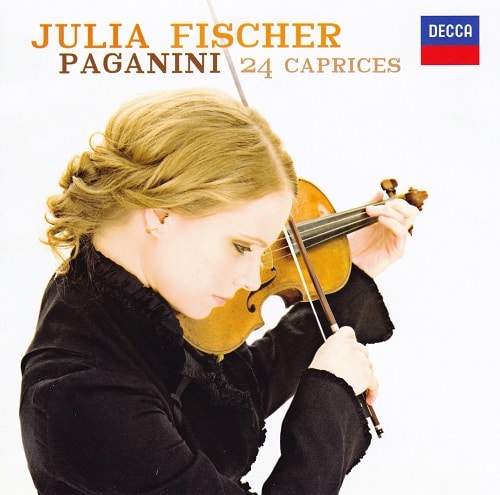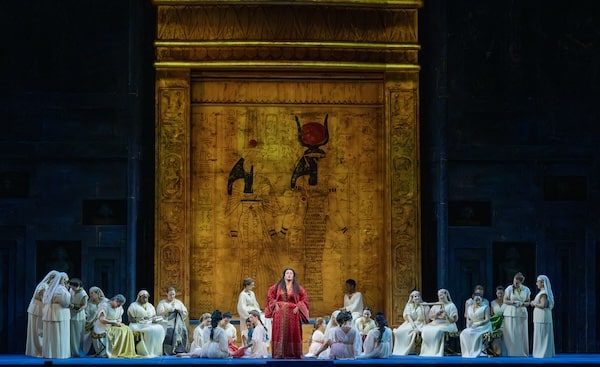Star soloist: I haven’t bought a CD in 10 years
mainThe German violinist Julia Fischer now runs her own streaming service.
She tell the NZZ: ‘I’m not interested in this format either as an artist or as a consumer. Of course, there are still people who shove a CD into a player at home. But I do not know if they will be around in twenty years’ time. All I know is that I have not bought a CD myself for ten years. And that goes also for my whole circle of acquaintances – musicians and non-musicians alike.’
Sagen wir, es interessiert mich in dieser Form nicht. Weder als Künstlerin noch als Käuferin. Es gibt natürlich noch Menschen, die sich eine CD zu Hause in den Player schieben. Aber ob es sie in zwanzig Jahren noch geben wird, weiss ich nicht. Ich weiss nur, dass ich selbst seit zehn Jahren keine CD mehr gekauft habe. Und in meinem ganzen Bekanntenkreis – bei Musikern wie Nichtmusikern – ist es ähnlich.
Read on here.







I had a first row ticket for Julia Fischer’s recital at the Wigmore Hall last night. Her playing was absolutely brilliant. Although I enjoyed all four pieces, I found her interpretation of Szymanowski most moving.
I had a great privilege of hearing her on another occassion in Boston in 2015 when she played the Brahms Violin Concerto with the BSO – a highly dynamic and muscular performance, which I thoroughly enjoyed, too.
What an amazing artist and a beautiful woman – wishing her all the best and hoping for more magnificent concerts!
Her encore of Handel-Halvorsen Passacaglia – together with Daniel Müller-Schott – was the best thing about the Bavarian State Orchestra concert at Carnegie Hall earlier this year. Next best thing was their playing of Brahms’ Double Concerto. Next best because of the lethargic conducting and substandard orchestral playing.
One of my favorites. Her Bach Partitas are also brilliant.
And more CDs!
Hmm. Musician who performs or hears live music almost every day doesn’t have a need for recorded music… I wonder why?
There are other ways to listen to recorded music. That’s the whole point of this.
Neither have I
I am in my mid-50s and if I have inherited my parents’ genes combined with some good luck, I”ll be around for easily 30-40 years.
Had I started listening to recordings a decade ago, I would have gone digital.
Yet by the time lossless formats were available, I had already amassed a collection of about 2,000 CDs. My current old fashioned system works. Digitizing them would be a huge undertaking, in labor and money. Why do it? And let’s not get started about the booklets or cataloging software.
+1. I am very happy with my collection of 10.000 CDs.
So am I. And it’s nice to browse in one’s own “library”.
Someday record companies will stop making them, but that’s not a problem since we collectors have a nice library. What concerns me is having good players. They’re already getting scarce, and good ones are quite expensive.
“What concerns me is having good players.”
All you need is any CD player that dumps the digital data out through an HDMI cable, and then it is your receiver and speaker setup that matter. Claims that one CD player is better than another are generally audiophile snake oil.
“All you need is any CD player that dumps the digital data out through an HDMI cable, and then it is your receiver and speaker setup that matter. Claims that one CD player is better than another are generally audiophile snake oil.”
Actually, much depends on the quality of digital-to-analog converter (DAC). I’ve used three different CD players via standard analog connection with the same amplifier and speakers, and there is definitely a difference. The old Denon sounds bright and slightly compressed, the NAD sounds warm and full, while the Rotel sounds very clear and balanced. The benefit of using the digital connection via HDMI is mainly that of sending the digital signal to an external DAC or the DAC in your AV receiver/amplifier that is of audibly superior quality to the CD player’s internal one.
She doesn’t say she doesn’t listen to “recorded” music, just not CDs.
First, I’ll join in the praise of Fischer — she’s a remarkable artist. I wish my German were better, but I can make broad sense of the piece (almost better sense than computer translation makes of it).
I do feel a bit out-of-date, but over all I still find c.d.s more convenient for home listening, and even the best software seems to have occasional problems with meta data, organizing tracks, etc., and then I still have to read the booklets or inlays digitally instead of having a handy hard copy. I do have a lot of digital music, but I still like my c.d.s. In fact, a dozen just arrived in the mail.
However, I am very glad to see more variety in streaming services, and artist-led ones are very appealing. I used to subscribe to Classics Online, and I would still happily pay, say, twenty dollars a month for even a BIS only c.d. quality streaming service. I hope more artists and small labels go their own way…. Digitalization of things has helped make the arts far more democratic again, and thankfully is undermining the tyranny of the gatekeepers.
Perhaps it is just age (I’m 77), but I’ve yet to buy a download, although I do watch live streams of operas. I much prefer the physical format of CDs (and for opera DVDs) over downloads which I don’t trust not to evaporate unexpectedly from my computer(s). I should add that for the things I want I am computer literate. eg I can typeset a complex vocal and orchestral score of several hundred pages, but remain incompetent on my smart-phone (which I dislike intensely). It can take me a dozen attempts to text ‘OK’ on the thing, and then I probably send it to the wrong person in the process visiting a web-site I don’t mean to visit and registering for something I don’t want.
Anyway, I hope CDs and DVDs long remain available for old men like me to buy. I’ll survive if they disappear, but…
The cloud-based music streaming or any other kind of service is more reliable, mobile and ubiquitous. The difficulty is how to discard them as they will always be there.
This is why we can’t have nice things.
Last year I contacted a number of smaller recording companies about their plans for phasing out CDs. Most stated that sales were generally robust given the market and there was no plan to phase out this format. The market for CDs is generally stronger is Asia than in Europe and North America according to the companies I communicated with.
I bought a lossless download once because it was a Polish disc and no longer available to buy, not even to import from Poland. The annoying thing is the risk of losing it. I had it on a laptop that broke and had to attach the hard drive to my new laptop to recover it (it was almost the only thing I hadn’t backed up). I now have that disc backed up several places as the download is not even available online any more. I guess that’s something you don’t really worry about in the same way with CDs.
Three points unaddressed in the thread, far as I can see:
— Streaming services are notorious for paying horrible artist royalties;
— Digital music is compressed, losing a bit of audio detail in the process; and
— CDs wear out in, say, 30 years or so after manufacture.
On that last point, I should add that hasn’t happened to me, but a friend is diligently uploading all of his collection to hard-drives for that reason, compression issues notwithstanding.
“Digital music is [lossily] compressed, losing a bit of audio detail in the process”
This is not necessarily the case. There are already streaming services that are offering lossless streaming, so you are getting the same quality as if you bought a CD and ripped it to FLAC yourself. In fact, lossless streaming may in fact be superior to CD sound, as classical music downloads are generally 24-bit these days, while CD sound is limited by the format standard to 16 bit.
Thanks for the feedback, Christopher. Just to clarify, may I ask if classical downloads from iTunes are ever 24-bit? I’m guessing not but honestly dunno.
I have to agree that the streaming services have a very poor payment scheme to artists. One of my employees calculated it would be cheaper to record and press a CD of his band’s music and sell the CDs at their gigs than to attempt to recover $0.00009 per click.
CDs should not wear out due to playing. I have CDs that are pushing 30 years old and they still play. They do sound a bit harsh due to the early recording technology compared to today’s releases. What can happen with older CDs is ‘CD rot’ where there is ‘bronzing’ around the edges of the CD caused by gaps at the edge from manufacturing that cause oxidation on the aluminum layer. I just pitched about 20 Nimbus, ASV, and Hyperion CDs from late 80s and early 90s where this occurred. The problem was traced to poor quality control at a Dutch pressing plant used by several CD labels. This was sorted in the mid-90s and the problem has not returned.
For those still wondering about the availability of CD players, most of the European hi-fi manufacturers have abandoned this format since Philips stopping making CD drives several years ago. All CD drives are now sourced from Japan. Most Japanese hi-fi manufacturers still make CD players at various price points.
Thanks, Neil! Makes all the sense and is also reassuring, as I’d love my daughter and grandkids to get some use out of my CDs some day.
Carl – if you want lossless (or 24 bit better-than-lossless) quality, you need to avoid the mass-market providers like iTunes, Google and Amazon.
I use Qobuz and eclassical but other sources are available.
Thanks much, Mathias! Been meaning to check out Quobuz …
I also still spins CDs but my favourite medium is still a vinyl record. So easy to use and sounds great. Plus classical records are relatively cheap. Problem with a CD player is that transport and laser have a finite life span and not sure how long they can be serviced into the future. Many of my friends use a streamer and a high resolution files (24/96 and up ) *can* sound better than a Redbook CD replay but the set up seems complicated.
Funny you mention vinyl. Only last night I was having dinner with a friend of mine who has spent his entire working life in the sound recording industry. I asked whether it’s true that vinyl has better sound quality than CD and he was fairly emphatic that it does not. He assures me that CD remains the gold standard for quality sound recording and that people only imagine that vinyl sounds better because of sentimental attachment.
Two decades ago I bought a pretty good hi-fi system. It bordered on high end. I spent comparable amounts for CD and vinyl player. CD won, by a slim but clear margin.
Had I bought a high end turntable and stylus, and possibly spent even more money on an LP washer and new LP sleeves, I would have gotten a much better sound out of LPs, and probably better than anything I could get out my CDs.
Let’s get real. Life happens, there are other priorities too. I am pretty content with my CDs and even more so with my few SACDs, and don’t have to bend over backwards financially or otherwise.
The sound quality hugely depends on quality of media as well as a replay equipment. So I am not surprised many folks believe CD will be always better. I certainly can’t say vinyl replay *always* sounds better it all depends.
The sound quality of CD also varies depends on manufacturing and production process. There are a few instances that I can say CDs sound better than vinyl replays. ( JVC XRCD Toscanini CD releases or RCA’s early 90’s Reiner/CSO Lut. Kije )
Most interesting case I have encounter is various releases both CD and vinyl of Glenn Gould’s 2nd Goldberg Variations recording. ( Columbia/Sony ) Sony recorded it digitally but made sure also ran the analogue recorder side by side just in case. When I compared to the original ’82 *digital* vinyl release to 2002 CD remaster ( sourced from the analogue tape instead of a digital source ) This hands down win in dynamic contrasts. Astonishing amount of low level details emerges from a CD. The original vinyl sounds anemic and flat comparatively.
Then Sony came out with a *analogue* tape vinyl record of the same recording in 2015. The same remastering engineer Andreas Meyer worked on it. So now I have a digitally sourced vinyl vs. analogue vinyl and CD of the same recording. Pressed at MPO France, my issue is flat and quiet. On my replay set up, the final analogue sourced vinyl remaster sounds the most natural and Immediate than a CD plus equally quiet background and superior dynamics. Either case, both CD and remaster *analogue* vinyl left the digital original record completely dead.
Now what would be interesting is that if there was a native high resolution file or even a properly ripped CD file available on the same recording and if it’s played on a decent streaming set up, they might sound better.
In 30 years, perhaps digital recording might progressed but every time I see a new *digital* reissue on vinyl I often wonder how much better it would be if this was recorded in all analogue domain.
I still buy CDs. But I haven’t bought a Julia Fischer CD in 10 years.
😀 😀
Just judging by the bi-monthly Naxos new release catalogs (they distribute a ton of labels in the U.S.), it appears that CD’s are not going away any time soon. There seem to be as many releases as ever – just not so much with the ‘major’ labels.
I read an interview with Claus Heynman (spelling) chairman of Naxos where he bemoaned that selling CDs was no longer profitable. Robert Bahr chairman of BIS (Swedish label) expressed similar sentiment in another article….we shall see.
I had a collection of records, and an expensive borderline high end analog replay system. Could not compare to the best modern digital recordings. The laws of physics govern the limits of analog. Dynamic range of digital in 24/96 is incomparable. Not to mention higher resolution recordings. Besides, the records are like a slow meal in a fancy restaurant. These days people rarely have the patience. In preparing to move countries for work, I gave away all of my LPs and CDs (2000+) after converting it to digital. I also got rid of the bulky rig. I have got more than 5000 recordings in full resolution on Hard Drives, everything in a duplicate to prevent from HD failures. I haven’t bough a CD for a long time. With a high quality DAC and active speakers, I miss nothing. However, for convenience, the most of my daily listening comes from lossless streaming services) Tidal and similar). I am 55 and I see no reason to ever return to a material media. The most important, at least for me, is to attend as many concerts as I can and support the musicians in that way.
What kind of software did you use to convert your cd’s and what to catalog the music?
Hi Petros,
It was Ashampoo mostly for ripping the discs, but there are better ones now. I haven’t used any current app simply because I have nothing to rip any more.
I use Neutron Player on Android and Windows, also Foobar as it is very flexible.
For Video, I use VLC. I also use Plex Media server for all formats on remote HDs.
I own the following equipment:
DroidBox (PCM) or Humax (Over Carat Ruby DAC) > Yamaha WXC-50 (streamer and DAC) > Myryad Z40 (Preamp and headphone amp) > Mackie HR624 Active pro Monitors + 2 Wahrfedale SW150 Subwoofers (Yes, I use 2 subs, please check the Dr Earl Geddes’ articles on the topic. I will consider switching to double REL subs). I also use AKG K701 as reference Headphones, Sennheiser Momentum (Over the ear) with FIIO E17 for a mobile setup and Samson S-Amp 1>4 Headphone extender amp with 2 x Samson SR850 for AV over headphones listening. Cables are Sommer Carbocab 225 for ANalog and Belkin for digital.
Hope it helps.
Best regards,
Dan
Bristol
As a CD/record shop owner in Vancouver Canada, I find Ms Fischer’s comments interesting, to use a word. I can think of few other words that might, perhaps, apply. We have a large customer base, and, granted, a part of it is – but not limited to – an aging demographic. While I am sure JF did not intend her comments to be in any way insensitive, they can definitely come across as such. “But I do not know if they will be around in twenty years’ time” – I can only assume and hope she was referring to CDs and not the people that listen to them! That being said, it appears from other comments that I am not the only one who read her statements in such a dual light.
But in a more general response, I find that instead of marginalizing the CD (and again, hopefully not the people that prefer them!), JF’s comments are interesting for what they don’t contain. I don’t get a sense from her – at all! – of gratitude. When I think of all the people over the years who have actively sought and purchased recordings by this truly great artist, I think that JF might wish to sound more grateful and appreciative to all the people who have supported her and her music by purchasing her recordings in every format – CD, vinyl, and digital/streaming media.
I am abundantly aware of the changes in the recorded music industry, but I am also finding – both in JF’s remarks and the remarks of some of my own customers – there is an inherent insensitivity built into the attitudes of a certain demographic, and there needs to be a greater appreciation for the means by which an individual chooses to listen to music. I would be confident in saying that if one wanted to listen to music whilst washing the dishes or walking one’s dog, then by all means, listen to that MP3. But, for a truly real musical/listening experience, the physical disc (be it CD or LP) is still best for that purpose. The only better way is to attend concerts and hear it in its purest form, right from the bow JF is holding in her hand. The CD and LP are still actively purchased and enjoyed, and perhaps JF should try to be more mindfully aware of who and what has helped her along her rather brilliant path.
Two comments:
1. Record sales simply do not matter much to artists anymore, since they don’t make much money from it (contrast with period 1960-2000). If anything, musicians use record sales to drive ticket sales to live performances.
2. The sale of records on CD won’t ever disappear (I will always buy them, for instance, and there are many other people who share this sentiment). But the number of CDs sold is declining steadily, and is likely to continue to decline over the next 20 years, becoming more niche. Nevertheless, there will always be a market for sales on a physical medium, and CDs are the best medium for this.
And with any luck there will be younger people still interested in owning classical cds so I can bequeath my substantial library to someone who will appreciate it. The thought of them being dumped in a landfill is horrifying.
This is ironic given that it is the Super Audio CDs released by Pentatone that really launched Julia Fischer’s recording career. Not to discount her playing, but it is the prospect of superior sound quality that first made many of us add these recordings (of music we likely already had in other versions) to our collections.
Today SACDs — while admittedly a niche market — still offer sound equal to or better than most downloads, and they do so at a price that’s typically lower, while also providing cover art and liner notes.
Meanwhile, there’s a well-known phenomenon in which things that one’s parents had are considered uncool, whereas things from grandparents and before start to becoming cool again. That partly explains the vinyl revival, as well as why younger auto journalists want manufacturers to stop pumping out SUVs and CUVs and start making station wagons again.
Thus, CDs, as the last physical music medium – with covers, however small, liner notes, and the cohesion of coming in “album” format — will inevitably become collectible. People will look back on the days when they were available so cheaply.